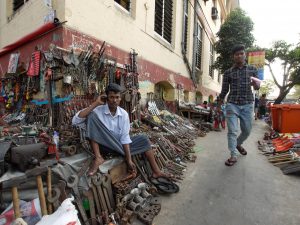The U.S. government has introduced new trade restrictions against Myanmar’s military government, in response to its escalating violence against unarmed protesters this week.
In a statement Thursday, the Department of Commerce said it had added Myanmar’s Ministry of Defense, Ministry of Home Affairs, and two top military conglomerates – Myanmar Economic Company (MEC) and Myanmar Economic Holdings Limited (MEHL) – to a trade blacklist.
The department has also subjected Myanmar to “military end use” export control restrictions under the country’s Export Administration Regulations (EAR), requiring American suppliers to apply for hard-to-obtain licenses to ship the country certain items.
“We will not allow the Burmese military to continue to benefit from access to items subject to the EAR,” the Commerce Department statement said. “The U.S. government will continue to hold perpetrators of the coup responsible for their actions.”
The announcement came two days after soldiers and police killed 38 people in the bloodiest day of protests so far. The rights group Fortify Rights said on Thursday that at least 61 people have been killed since the military coup on February 1, a death toll eclipsing that of the 2007 Saffron Revolution. According to the United Nations, more than 1,700 people have been arrested, including 29 journalists.
In its statement, the Commerce Department said that it was “reviewing potential additional measures as warranted by the military’s actions.”
The trade measures follow President Joe Biden’s announcement on February 10 that the U.S. would impose targeted sanctions on leading military commanders and their families. Biden also announced that the U.S. government had taken steps to prevent the generals from “improperly having access” to $1 billion in Myanmar government funds.
According to a Reuters article published yesterday, the U.S. freeze came after the new military government attempted to move about $1 billion held at the Federal Reserve Bank of New York three days after seizing power. According to the report, the attempted withdrawal marked an apparent effort by Myanmar’s generals to limit their exposure to the international sanctions that they expected rightly would follow its overthrow of the country’s democratically elected government.
In themselves, the Commerce Department’s measures are unlikely to have a dramatic effect. As William Reinsch, a former Commerce Department official, told Reuters, “The volume of trade is small so the impact won’t be big.”
Yet more U.S. actions are almost certain, especially if the situation inside Myanmar continues to deteriorate. Washington could potentially impose further restrictions on MEC and MEHL, the two sprawling conglomerates that the Commerce Department added to its trade blacklist.
The two holding companies connected the Myanmar military to nearly every sector of the country’s economy, from mining and telecoms to beer, cigarettes, and real estate. Given their importance as a source of revenue for the military, the two conglomerates are a logical target for American sanctions, which would prevent them from making any transactions with U.S. persons or having any contact with the U.S. banking system.
But given the centrality of these conglomerates to Myanmar’s economy, action against them could well have collateral economic effects on the country’s population at large, something that most Western governments say they are determined to avoid. The question of whether to add MEC or MEHL to the Treasury Department’s sanctioned entities list is likely to be considered carefully by the U.S. government.
In addition to the U.S., Canada, the European Union, and the United Kingdom have all imposed sanctions following the coup and its violent aftermath. The United Nations Security Council is also due to meet today to discuss the situation in Myanmar, although any forthright action will likely founder on the vetoes of China and Russia.
Beyond their function as a signaling mechanism, it remains to be seen the extent to which Western economic sanctions will affect the military government’s calculations. The junta says it is ready to withstand sanctions and isolation, something that it showed during the long period of isolation that proceeded the country’s political opening in the 2010s. Christine Schraner Burgener, the U.N. special envoy on Myanmar, said that she had a recent conversation with Myanmar’s deputy military chief Gen. Soe Win, who told her that his government was ready to weather any Western pressure.
“The answer was: ‘We are used to sanctions, and we survived’,” Burgener told reporters in New York. “When I also warned they will go in an isolation, the answer was: ‘We have to learn to walk with only few friends.’”
It’s hard to imagine the junta saying anything different – and the general is likely correct that sanctions alone will be unlikely to move the junta to meaningful action. But the presence in the streets of millions of pro-democracy protesters might shift the equation somehow.
The weeks and months to come should give us a clear sense of whether the general was correct, or simply bluffing.

































